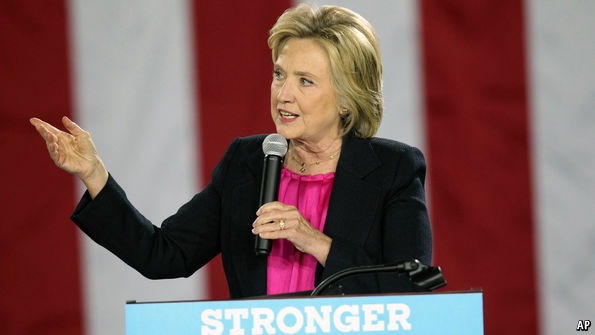Dullness confronts fantasy when the candidates debate foreign policy

HILLARY CLINTON used flag-waving speeches in Florida and North Carolina this week, and a military-themed television forum in New York, to accuse her Republican rival, Donald Trump, of talking down the armed forces and failing to cherish the military alliances that underpin America’s global standing. Mrs Clinton’s hawkish instincts are sincere: several times as Secretary of State from 2009-13, she was readier to use force as a tool of geopolitics than was her boss, Barack Obama.
But politics also explains her focus on whether Mr Trump has the temperament to be commander-in-chief. Recent opinion poll averages have tightened, suggesting that Mrs Clinton has lost as much as half of the roughly eight-point lead that she opened up after the national conventions in July, and that a fifth of voters are undecided, essentially because they dislike both candidates. With millions of Republicans, notably those with college educations, expressing distaste for Mr Trump, the Democrats have much to gain from casting the property developer as a menace to America and the world.
A speech in Tampa was billed by the Clinton campaign as making a case that their nominee knows how to keep America safe, while Mr Trump is unfit to be commander-in-chief. Alas her address was lacklustre and rambling, ranging from education policy to the importance of infrastructure (“what about our water systems, our sewer systems?”) before reaching foreign policy. The crowd did its bit, cheering lustily as she recalled urging the president to launch the raid that killed Osama bin Laden in 2011 (“You go girl!” shouted a woman). Mrs Clinton scolded Mr Trump for being “very loose in his talk” about when nuclear weapons should be used, and for saying that as president he would order the use of torture, which she said would imperil Americans worldwide.
There is a faint element of awkwardness when Democrats play hawk. The air force reservist chosen to introduce Mrs Clinton in Tampa was a shy former boss of an aircraft maintenance squadron, rather than a bullet-chewing warrior-type. In the crowd, Thomas Abel, a retired geologist sporting a “Vietnam Veteran” baseball cap at the Clinton rally, loyally condemned Mr Trump as frighteningly unpredictable. But he also admitted that he does not usually wear a veteran’s hat or other signs of war service, and chose his headgear to make the point that not all ex-soldiers are Republicans. Another veteran at the Tampa rally, Laura Westley, a graduate of the West Point academy for army officers who took part in the 2003 invasion of Iraq, says that ex-soldiers, like all voters this year, are sharply divided by education and gender. “There’s a big divide between officers and enlisted,” she says, with rank-and-file troops stirred by Mr Trump’s talk of “fighting and winning”. Mrs Clinton’s use of an insecure e-mail system as Secretary of State enrages many fellow West Pointers, she admits, who insist that, had they done the same, “they’d have lost their security clearance.”
Mr Trump held his own military-themed campaign events this week, blending vague promises to increase defence spending with fact-trampling claims about a dangerous world which fails to “respect” America. Quizzed on foreign policy at a forum in Virginia Beach, Mr Trump seemed to believe that North Korea will “soon” have an aircraft-carrier (which is news to Korea-watchers) but that he will “very simply” oblige China to rein in North Korea. Turning to the fight against IS, he suggested that finding common cause with Russia against Islamic extremism would be “nice” and work better than Mrs Clinton’s tough talk about President Vladimir Putin, adding: “Putin looks at her and he laughs.”
Addressing supporters in North Carolina, Mr Trump abruptly backed away from repeated boasts that he has a “foolproof” plan to defeat IS, which he is keeping secret to remain “unpredictable” and avoid tipping off the enemy. Mr Trump now says that, within 30 days of becoming president, he would ask “top generals” to hand him a plan for “soundly and quickly defeating” the extremist network. His campaign unveiled endorsements from 88 retired generals and admirals, prompting Team Clinton to release a list of 95 former generals and admirals who back her, and to note that the Republican nominee in 2012, Mitt Romney, found 500 flag officers to endorse him.
A televised forum in New York, hosted by NBC News and the Iraq and Afghanistan Veterans of America, a charity, pointed up the downsides of Mrs Clinton’s extensive record. A Republican member of the audience charged that she had “corrupted” national security by mishandling e-mails at the State Department, and a Democrat asked sceptically about her “hawkish” foreign policy. Mr Trump played a strongman who is above mere details, declaring that under Mr Obama “the generals have been reduced to rubble” and that America has “the dumbest foreign policy”. Asked about praise from Mr Putin, he said the Russian president: “has very strong control over his country,” while Mr Obama runs a “divided country”—as if democracy is rather a nuisance. He vowed to rebuild a “depleted” military while being “very, very cautious” about using it. At its core, Mr Trump’s pitch is simplistic, chin-jutting, isolationism with a strong dose of wishful thinking.

No hay comentarios.:
Publicar un comentario